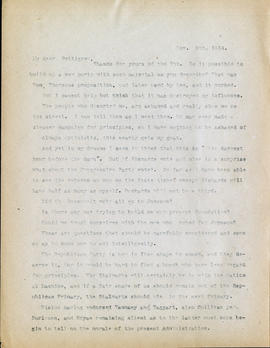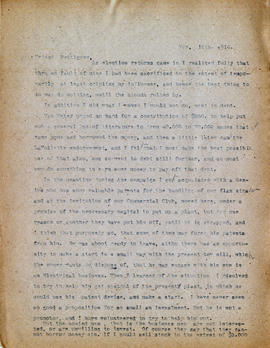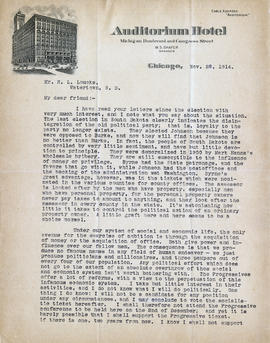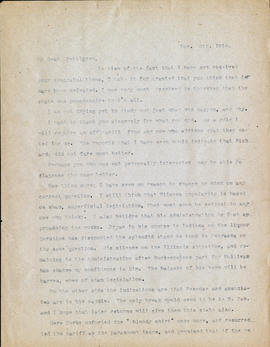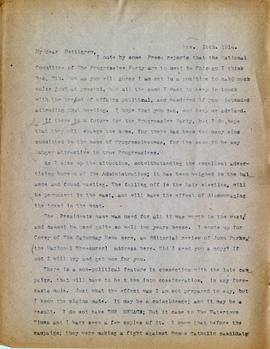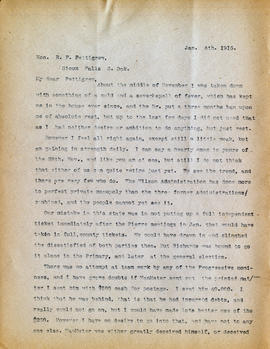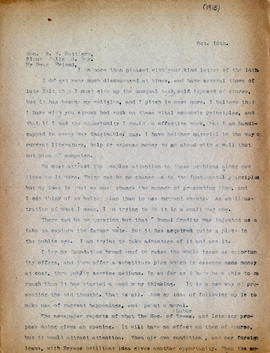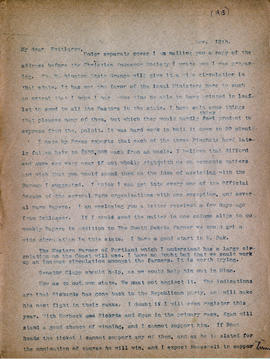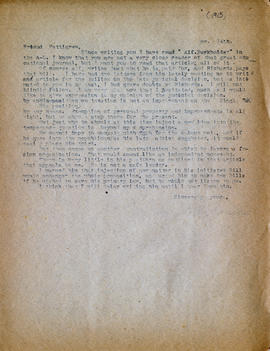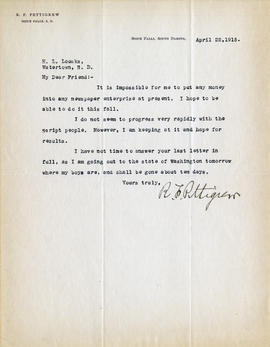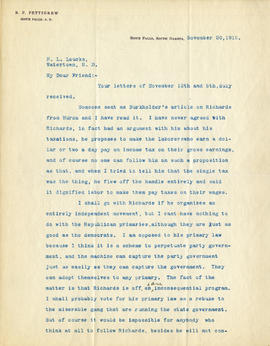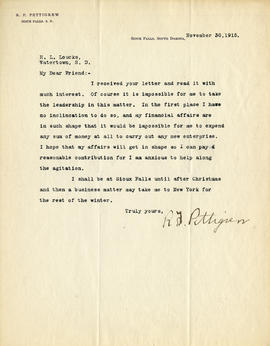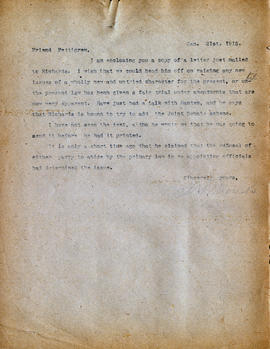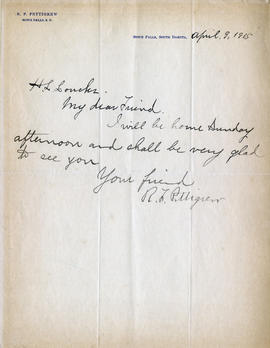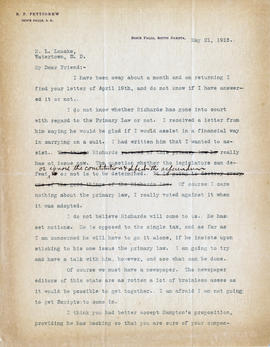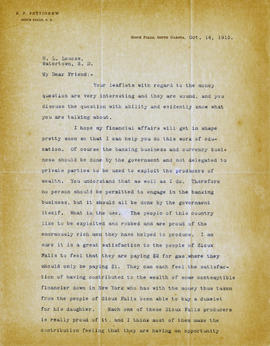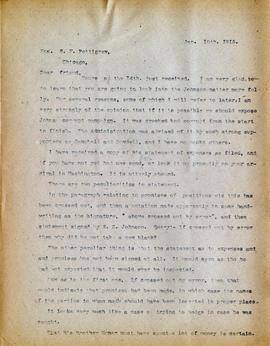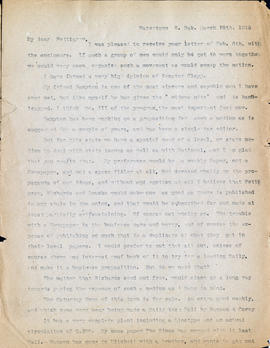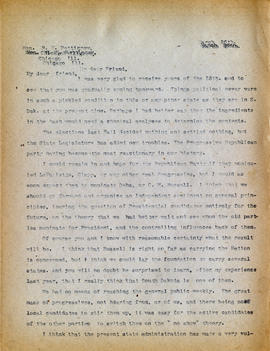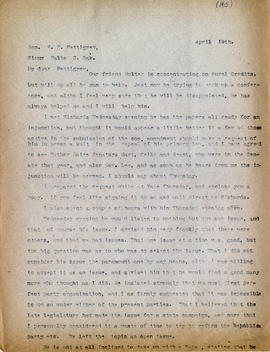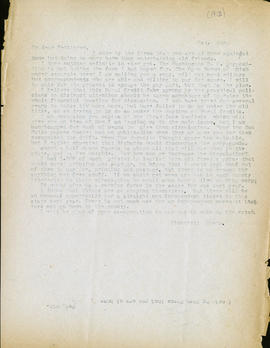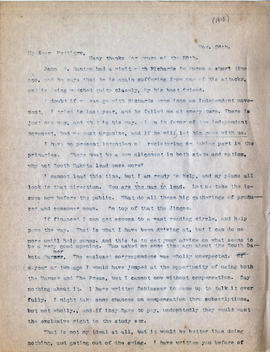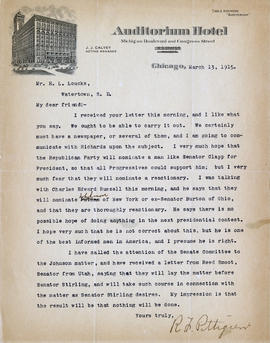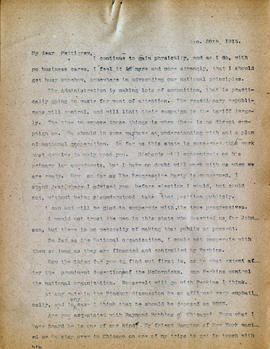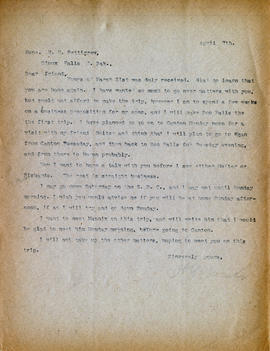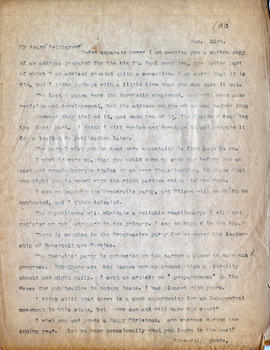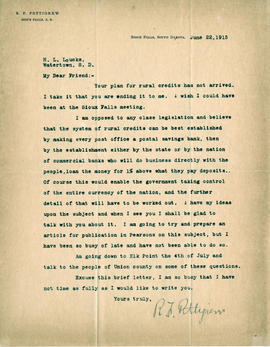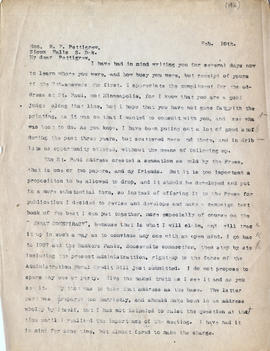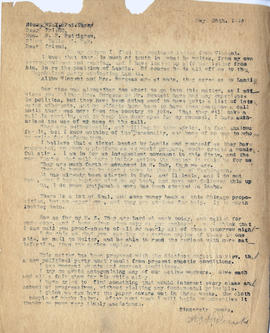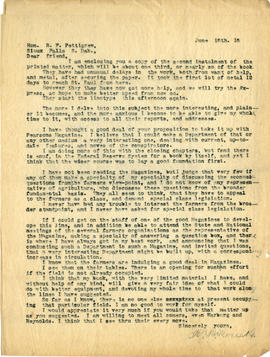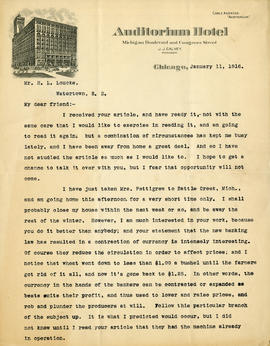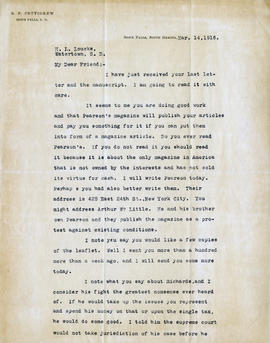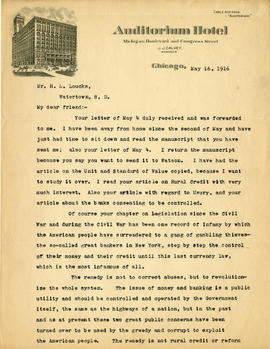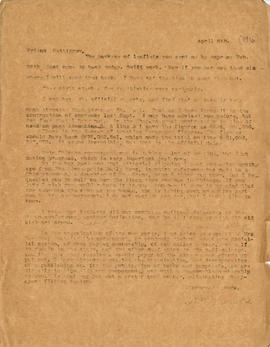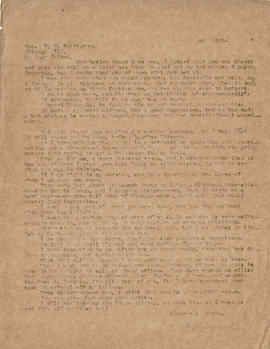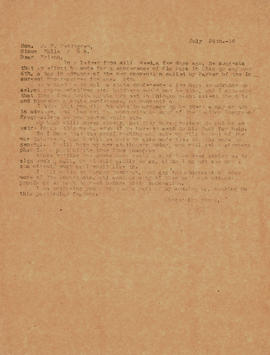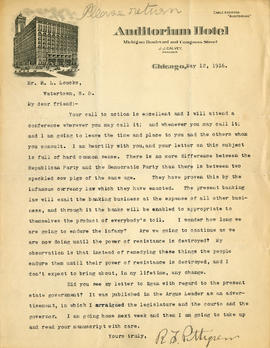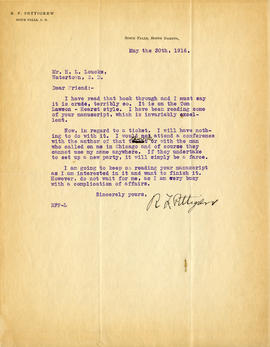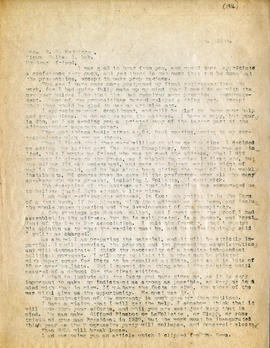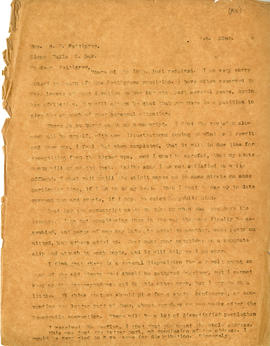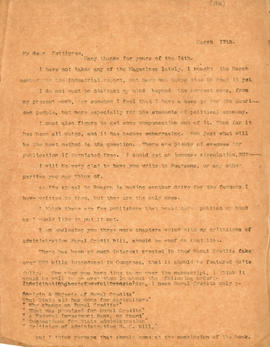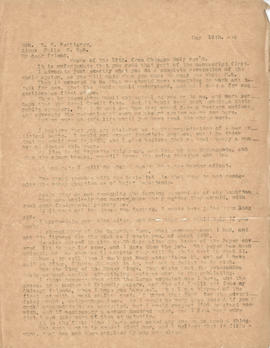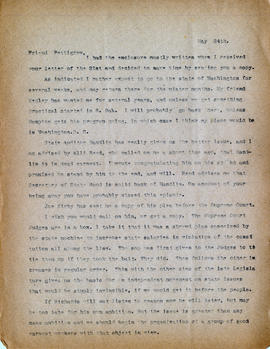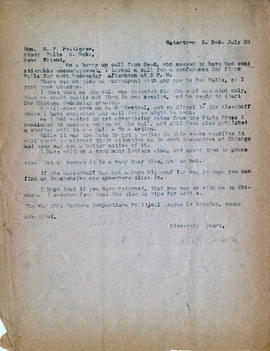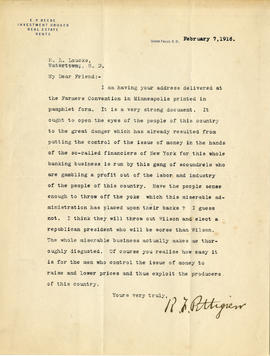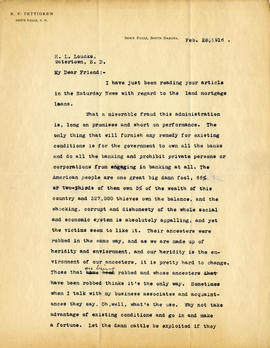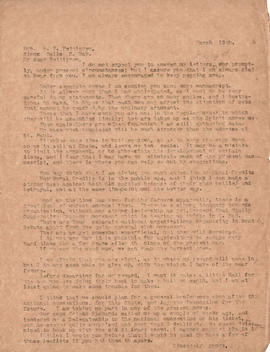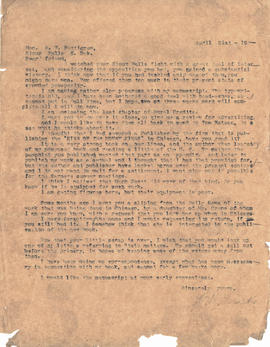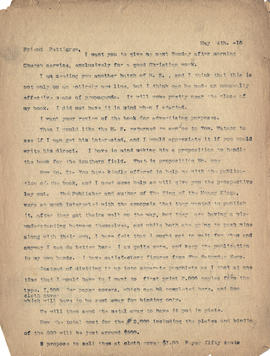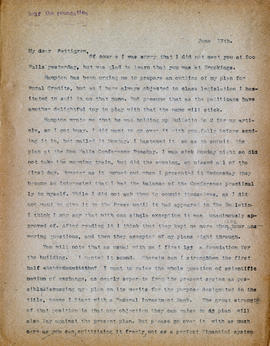Letter from H. L. Loucks to R.F. Pettigrew about the elections of 1914. Loucks describes his disappointment in loosing the local election and comments on the South Dakota's Progressive Party. Loucks also comments on the state of national politics and the losses in the Progressive Party.
H. L. Loucks writes to R.F. Pettigrew about losing the election for United States Senator from South Dakota. Loucks discusses campaign contributions to the national Progressive Party. He also talks about an investment opportunity for a plant to process flax straw.
R.F. Pettigrew writes to H.L. Loucks concerning the current state of the nation and state politically. Pettigrew discusses his dislike for President Wilson and the current administration. Pettigrew also mentions the money expenditure used to pay for tax pamphlets and being printed in newspapers. Finally, Pettigrew begins partnership with Loucks for the coming months.
H. L. Loucks writes to R.F. Pettigrew about the elections of 1914. Loucks speculates that he had lost the election for senator from South Dakota and thanks Pettigrew for his assistance. Loucks also makes comments about the national election results.
Letter from H. L. Loucks to R.F. Pettigrew about the development of the Progressive Party. Loucks believes that the name should be changed due to the bad public image of progressivism. He mentions the anti-Catholic sentiments during the elections of 1914 around the country. He also talks about President Woodrow Wilson's policies and his tendency to support special interest groups. Loucks proposes a strategy for the Progressive Party for the 1916 elections. He also comments that the Republican candidate (Coe I. Crawford) wants to contest the election of Edwin Stockton Johnson (Democratic candidate) as Senator of South Dakota. Loucks states that he would like to see an investigation into the primary and election for the Senate seat.
H. L. Loucks writes to R.F. Pettigrew about his lingering illness and his long recovery. He discusses the 1914 election including his campaign, losing the election, his opponent: E.S. Johnson, and his conclusion to continue as an independent candidate. Loucks also talks about Richard O. Richards continuing in state politics.
H. L. Loucks thanks Pettigrew for his support. He mentions taking advantage the "rural credit" issue to advance his agenda. He also talks about furthering his views by giving an address to the Christian Endeavor Society and visiting with farm and labor organizati
H.L. Loucks writes to R.F. Pettigrew about distributing copies of the address he gave to the Christian Endeavor Society. He mentions the inheritance that Amos and Gifford Pinchot received and suggests that Pettigrew contact them for their assistance in the progressive movement. Loucks talks about inserting leaflets into the local papers and the South Dakota Farmer to promote progressive ideals. He discusses the state primaries for the elections for 1916. He suggests that if the progressive movement could remove Roosevelt and Perkins, then they would have a real progressive party. Loucks talks of feeling betrayed by Richard O. Richards and has no confidence in the state's Republican Party. At the end of the letter her announces that the People's Money League of Chicago has accepted his 'rural credit' plan.
H.L. Loucks writes about his misgivings of Richard O. Richards and his views on taxation and temperance. Loucks does not trust Richards and is hesitant to write an article for him that Richards would want published in local newspapers.
R.F. Pettigrew writes to H.L. Loucks regarding to the Pettigrew's lack of funds to invest into the newspapers currently. Pettigrew also mentions that he is traveling to Washington State to visit his boys and will be unable to respond to Loucks completely.
R.F. Pettigrew discusses with H.L. Loucks his disagreement with Richard O. Richards and his most recent proposition of an income tax. Pettigrew mentions that he would join Richard O. Richards if he organized an independent movement that was not reliant on any of the current political parties. Pettigrew expresses his aspiration to build up either a progressive or people's party that supported the workers.
R.F. Pettigrew writes to H.L. Loucks concerning Pettigrew's desire to take leadership on a present matter as to which he has none. Pettigrew also mentions that his finances keep him from supporting Loucks in the manner in which he would prefer.
H. L. Loucks writes to R.F. Pettigrew regarding Richard O. Richards and his primary law and amendments.
R.F. Pettigrew sends a short message to H.L. Loucks detailing Pettigrew's return home and desire to see Loucks.
R.F. Pettigrew writes to H.L. Loucks concerning the Richards Law and current referendum in the State legislature. Pettigrew believes that Richards must go alone while still arguing for Primary Law. Pettigrew also mentions the continued desire to buy a newspaper though expresses his inability to do so with current funds.
R.F. Pettigrew responds to H.L. Loucks affirmation regarding Loucks money question. Pettigrew laments of his inability to financially help Loucks in his education endeavors and hopes that his financial condition will soon recover. Pettigrew also speaks boldly of his dislike for money and how it influences the people of Sioux Falls.
H. L. Loucks writes to R.F. Pettigrew about the 1914 election for United States Senator from South Dakota and Edwin S. Johnson's campaign corruption.
H. L. Loucks writes to R.F. Pettigrew about his hopes for the national Progressive Party. He suggests that Pettigrew, Richard O. Richards and he start a newspaper to advance their political agenda. He mentions that the Saturday News in Watertown, South Dakota is for sale.
H. L. Loucks writes about the troubled state of politics in South Dakota. He mentions that he would be a part of the Republican Party if they would nominate progressive candidates. Loucks discusses the recent movement for farmers to organize. He mentions that Richard O. Richards has decided to remain in the Republican Party. Loucks believes that not all ballots cast for him were counted in the 1914 election.
H. L. Loucks writes about assisting Richard O. Richards in bringing up a suit to repeal Richards' primary law amendment. He also mentions that Richards does not want to start a newspaper. Loucks is still interested in finding a medium to publish his agenda and discusses the reliability of the press in South Dakota.
H. L. Loucks writes to R.F. Pettigrew about the leaflets he is publishing to promote progressive ideals. He thinks he will use the Rural Credit issue to bring attention to financial issues of farmers. Loucks mentions the upcoming 1916 elections and the likelihood of independent candidates.
H.L. Loucks expresses his doubt about joining Richard O. Richards in an independent political alliance. Loucks talks about not taking part in the state primary elections and that although he will not lead in the creation of an independent party, he will be willing to help the movement. Loucks asks Pettigrew to reread his address to the Christian Endeavor Society. He discusses his view regarding the money question and the preparedness issue.
R.F. Pettigrew talks with H.L. Loucks concerning the upcoming nomination for presidential candidate for the Republicans, as Pettigrew is hoping for a Progressive candidate as opposed to a reactionary one. Pettigrew also expresses his desire and agreement with Loucks concerning the procurement of numerous newspapers. Pettigrew also mentions various senators and party members, including Charles Edward Russell.
H. L. Loucks writes about his desire to be involved in politics at the national level. He mentions Richard O. Richards will continue his work with the primary law amendments and Loucks believes he will be an ally in the elections. He suggests that Pettigrew should contact progressive leaders throughout the United States.
H. L. Loucks writes to R.F. Pettigrew to make plans for visiting him in Sioux Falls, South Dakota and to visit other friends in Canto, South Dakota.
H.L. Loucks asks R. F. Pettigrew to read a copy of an address he gave at a meeting in St. Paul. Loucks states that he will not take part in the primary elections and that he cannot be part of the Progressive Party with Roosevelt and Perkins leading it. He feels that the Socialist Party's views are too narrow for him to join them. Loucks suggests that there is a good prospect in South Dakota for the rise of an independent party.
R.F. Pettigrew discusses with H.L. Loucks the plan for rural credits which has not yet arrived. Pettigrew strongly states his opposition to class legislation as well as the explanation for such opposition. Pettigrew briefly states his eagerness to write a letter for Pearson's Magazine on the topic of class legislation.
H.L. Loucks writes to R.F. Pettigrew concerning the 'St. Paul Address,' which garners him visibility. Loucks offers to have the address re-written in a more substantial form to gather more support from the people. He also inquires the help of Pettigrew in the capacity of reviewing Loucks present manuscript for a book which is slated to be published.
H.L. Loucks writes to R.F. Pettigrew concerning Pettigrew's upcoming political venture on a platform with Mr. Landis, which Loucks hopes will throw people for a loop. Loucks expresses his apprehension about Mrs. Burgess and her political aptitude.
Loucks speaks to R.F. Pettigrew about the progress of linotyping the manuscript as well as his desire to simply funnel all his time into the current writing process. Loucks also mentions that with his manuscript, he has not been reading much of the magazines but notices that the farmers have and he wishes to perhaps secure a post writing for such a magazine to benefit their organization
R.F. Pettigrew speaks with H.L. Loucks about the Loucks' current article and the arguments therein. Pettigrew mentions that Loucks should follow a particular strain of his own argument that would greatly benefit his article. Pettigrew also voices his dislike for the bankers and financiers of New York. Pettigrew briefly covers his thoughts in regards to 'intrinsic' and 'extrinsic value.'
R.F. Pettigrew writes H.L. Loucks stating his intent to read Loucks' manuscript. Pettigrew also states to Loucks that Pearson's Magazine would be a beneficial place to submit his articles. Pettigrew mentions that now would be an opportune time to begin working towards a constitutional convention in South Dakota with hopes of amending the current constitution.
R.F. Pettigrew writes H.L. Loucks concerning Loucks' manuscripts and articles, pointing out the pros and cons of both. Pettigrew mentions his decision to vote for the Socialists as well as the idea of building up a Socialist party. Pettigrew also states that he does not wish to help Loucks start a new party but will always be available to discuss questions of further importance.
Research notes recorded by Edgar S. McFadden. Research was conducted on barley verities: Success, Hanna, Gold, Minn 105, Odinbrucker, Gatami, Nepal, Hamchen; winter wheat varieties: Turkey, Red Chaff, Kharkov; Rye varieties; and Oats varieties: Ruakura, White Tartarian, Acme, Pelissur, Black Persian. Also included is correspondence between McFadden and J.A. Clark, Assistant Agronomist in charge of Western Wheat Investigation and the U.S. Department of Agriculture, Bureau of Plant Industry.
H.L. Loucks thanks R.F Pettigrew for the package of leaflets sent to him and sadly cannot use them and he plans to send them back to Pettigrew. Loucks also talks in length of the new party which they are going to start and the system by which it should be adopted.
H.L. Loucks writes to R.F. Pettigrew about the status current politics in terms of calling a national convention. Loucks also mentions a Mrs. A. Burgess, the daughter of a Mr. Crane, who is interested in reviewing the manuscript which Loucks continues to write.
Loucks continues to speak to R.F. Pettigrew regarding the necessity of calling a state conference with emphasis placed on finding new representatives. Loucks comments on the support and help of Alli Reed in terms of the manuscript and the framework of their organization. Loucks also mentions that his book in moving along, albeit, at a slower pace than he would prefer.
R.F. Pettigrew congratulates H.L. Loucks on his call to action in reference to a conference, one in which Pettigrew is most happy to attend. Pettigrew continues in speaking boldly of his dislike for the party system and their operations of disrepute.
R.F. Pettigrew articulates to H.L. Loucks his distaste for the book that Loucks recommended to him. Pettigrew also mentions that he would prefer to remain distanced from any conference with the author of the book. Pettigrew expresses great admiration and interest in Loucks' manuscript and desire to read it further.
H. L. Loucks writes to R. F. Pettigrew about a court case as to which Loucks is the primary counsel. Loucks mentions that he will use the argument going against the idea of 'rural credit.'; Loucks insists on Pettigrew visit Gifford and Amos Pinchot, whom Loucks deems capable of becoming national leaders.
H.L. Loucks responds to the R.F. Pettigrew and expresses sorrow for the current condition of Mrs. Pettigrew. Loucks also returns to his manuscript in speaking about how he wishes to take his time to write his statements and that Pettigrew may read and revise at his leisure, as there is no imminent reason that Loucks manuscript must be ready.
H.L. Loucks talks of his manuscript to R.F. Pettigrew, which has become something of a burden for him. Loucks also continues to talk of starting a new party, which will give them both leverage in the political realm. For now, Loucks determines that they ought to remain quiet and simply wait.
Loucks writes to R.F. Pettigrew concerning the cost of having part of the pamphlet printed as well as the pieces of the manuscript in friendly newspapers. Loucks hopes to copyright certain features of the pamphlet and manuscript to provide solid arguments. Mrs. Burgess urges Loucks to arrange a national call, which Loucks wishes to avoid at the present time.
Loucks talks to R.F. Pettigrew about the current state of their group which has not yet 'practical' levels in South Dakota. State Auditor J.E. Handlin is mentioned by Loucks for his earnest in taking a stand and Loucks wishes to stand by him. A Supreme Court plea is mentioned as well as various other people regarding politics and present status of South Dakota.
Loucks articulates to R.F. Pettigrew that an urgent call went out for a conference in Sioux Falls for their organization through the encouragement of Alli Reed. The call for a conference is not only to take place in Sioux Falls but also Chicago. Loucks also mentions that he believes the time is right for action for the Farmers Nonpartisan Political League.
R.F. Pettigrew writes to H.L. Loucks concerning Loucks' address which shall be put into pamphlet form. Pettigrew mentions his great dislike for financiers of New York and the hope that Loucks' address will wake the people up from the spell of the financiers. Pettigrew also comments on the optimism that the people of the country will vote in a republican President.
R.F. Pettigrew expresses to H.L. Loucks the corruption and fraud of the current presidential administration. Pettigrew mentions his sadness and anger over those who would do nothing to change what has always been. Pettigrew reassures Loucks that his work will bear reward someday.
The collection consists of correspondence between Henry Langford Loucks and Richard F. Pettigrew from 1914 to 1916, primarily discussing political issues related to the progressive movement in early 20th-century America. Loucks' letters to Pettigrew span from November 1914 through July 1916, while Pettigrew’s responses cover a similar period. In addition to the correspondence, the collection includes undated photographs, editorials authored by Loucks, and a 1917 pamphlet titled Will the Farmer be the "Goat" Once More?, which addresses agricultural and economic concerns. The materials provide insight into the political discourse and reform efforts of the time.
Loucks, Henry L. (Henry Langford) 1846-1928H.L. Loucks speaks of his manuscript to R.F. Pettigrew, which he is saddened that he must cut down so as to sell the finished manuscript for a set price. Loucks also mentions that he and Pettigrew should begin to plan for a general conference after the national convention. A mention of Richard O. Richards is also made near the end of the letter speaking of the national convention.
H.L. Loucks congratulates R.F. Pettigrew on his recent political fight, saying that Pettigrew gathered a substantial victory. Loucks also mentions his manuscript, the leaflet of Pettigrew's, and the potential publisher of both manuscripts. State primaries are coming and Loucks hope to circumvent any voting too far away from their party lines.
H.L. Loucks continues his previous discussion with R.F. Pettigrew concerning his manuscript and the purpose of said manuscript for their party. Loucks does not intend to wait for the potential publisher and instead plans to move ahead. Loucks hopes that Pettigrew will finish his review of the manuscript soon and forward the manuscript to Thomas Watson.
Loucks mentions to R.F. Pettigrew that Hampton is eager for Loucks to prepare an outline of his plan for 'rural credits.' Loucks briefs Pettigrew on the happenings of the Sioux Falls Conference in which his outline has been successful. Loucks also speaks of the new leadership within their organization and who will be helping to lead their organization.
